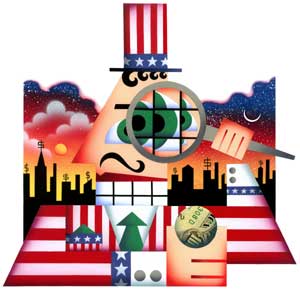
American Economy Once Again Faces a Confidence Challenge
On the headache-inducing topic of unemployment, the situation not only hasn’t improved recently, but instead has taken a turn for the worse. The numbers released on Sept. 2 by the Department of Labor illustrate that August’s non-agricultural unemployment rate stayed level with the previous month’s figure, holding at the high number of 9.1 percent. The newly added jobs figure was 0. The out of power Republican Party attacked the Obama administration, saying its economic policies caused the American job-creating machine to be “out of order.” Jobs are hard to find, salaries are declining, people’s confidence in the labor market is severely lacking. The White House Office of Management and Budget made a downward adjustment to the 2012 employment forecast just a few days ago; they now believe next year’s unemployment rate will remain at the high level of 8.3-9.0 percent. This prediction is more pessimistic than the predictions made in February of this year.
On the issue of financial control, people are concerned about whether Washington will be able to reach a reliable agreement for a proposal to reduce the deficit by winter of this year. After the compromise to raise the debt limit was reached during the beginning of last month, Congress went into recess and the intensity of public opinion over the debt reduction issue abated slightly. However, according to the outcome of negotiations between the two parties, by the end of November of this year, Congress’s newly established “super committee” must put forth a proposal to reduce the deficit. During an interview, Brookings Institution Senior Fellow Sarah Binder said that, according to historical experience and her own personal research, the probability of an implementable debt reduction proposal coming from this 12-member committee, with half of its member’s coming from each party, is doubtful. The workings of Washington obviously can’t keep up with the trends of the age, and this makes people worried about future policymaking, she said.
As for the issue of prospects for economic growth, economists generally consider America’s economy to have already entered the path of slow economic growth. Last week the White House adjusted the forecast for midterm economic growth downward. This year’s economic growth rate might be adjusted down to 1.7 percent, a full percentage point less than the forecasts from the beginning of the year. Despite forecasts that the next two years will see some acceleration, from the next five years’ predictions, America’s economic growth rate may hover around the low level of 2.5 percent. This kind of economic growth is unlikely to produce prosperity. In the foreseeable future, the lack of rapid economic growth will undoubtedly influence people’s consumption attitudes.
Facing a depressed economy, the Obama administration has made restoring market confidence an urgent priority. The U.S. population awaits the passing of Labor Day, when this president — who claims to have saved the American economy from entering a second Great Depression — will release a proposal to prevent the economy from sinking into a second recession and design a new growth blueprint for the country.
Economists predict that the Obama administration will continue to increase investments in infrastructure, expand exports, stimulate consumption, etc. In addition, it’s not hard to see that long ago Obama had already altered his sharp tone from the past two years on pushing for financial regulation reform, and come around to recognize the need to reduce the regulatory burden on the market. Recently the White House has continued searching for a means to stabilize the housing market. The Federal Reserve is also discussing continuing to stimulate the economy when a suitable opportunity arises.
From an international angle, America is devoting its efforts to attracting foreign investors to ensure that it remains the world’s most attractive place for investment. This not only includes government debt, the stock market and other virtual economy, but also foreign direct investment in America’s real economy.
During the 2008 presidential election when America’s economy was unstable, Obama used the slogan “Change” to win the faith of the people. Now, while preparing a re-election strategy, Obama has put out a banner of “Hope.” The difficulty lies in how, within the next year and some months, to persuade the voter to change “disappointment” into “hope” and change “doubt” into “confidence.” It will require not only beautiful rhetoric, but also persuasive economic accomplishments.
